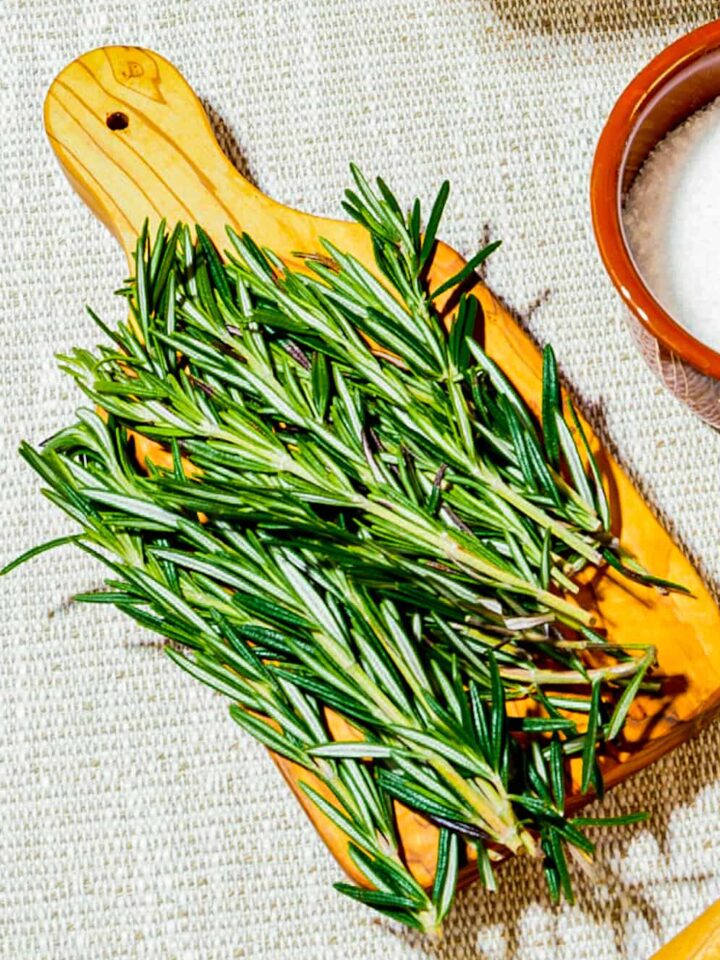Rosemary is a relative to the mint family, and the name is derived from its Latin origin to mean "dew of the sea." Rosemary is very common in Mediterranean cuisine and has a bitter, astringent taste. While that is true, it compliments oily foods very nicely. A tisane can be made from Rosemary leaves, which is also very popular when cooking.

First, it is burned and then added to a BBQ to flavor various foods. Unlike many other herbs, Sage has a high nutritional value and is rich in iron, calcium, and vitamin B-6, and is more nutritional in its dried form than fresh.
Rosemary should be harvested just as you will use it because it loses its flavor once dried. Gardners swear that if you plant some Rosemary plants in and around your garden, the Rosemary will fend off moths, beetles, and carrot flies.
Today, Rosemary is still used for many things besides cooking, as it is in potpourris, air fresheners, shampoos, and cosmetics. Scientific evidence has also been that Rosemary works very well as a memory stimulant.
Rosemary in the Kitchen

Craving some culinary inspiration? Dive into the world of rosemary-infused delights! Discover mouthwatering recipes like Rosemary Infused Honey, invigorating Rosemary Tea, and savory Rosemary Sea Salt. Unleash the magic of this fragrant herb in your kitchen today.
Rosemary is a versatile and aromatic herb hailing from the sun-kissed Mediterranean region. A popular ingredient across cuisines worldwide, it's highly regarded for its sharp, pine-like flavor that adds a unique twist to an array of dishes. From grilling fish to roasting beef and even game, Rosemary is your go-to herb for a splash of distinct flavor.
Aside from its culinary importance, Rosemary is also a horticulturist's favorite. It enriches your herb garden's visual appeal with woody stems that can be pruned into a conical Christmas tree-like shape. Also, in colder areas, it is an eye-catching addition to sunny windowsills during winter.
Growing Rosemary: Tips & Facts
As a proud member of the mint family, which includes illustrious members like basil, oregano, thyme, and more, Rosemary shares an ideal growing environment with them. A warm, sunny spot adorned with well-drained soil is where Rosemary thrives optimally.
Though a woody-stemmed plant, Rosemary can grow into a large evergreen shrub in blistering climates. However, its hardy nature does not extend to colder regions. Hence, moving this plant indoors when temperatures plummet below freezing levels is necessary to ensure its survival.
Making the Best Out of Rosemary: Usage & Storage Tips
The plethora of ways to incorporate Rosemary into your cooking routine is astounding. Its wonderful flavor enhances meat marinades remarkably well. Simply stripping the leaves from the stems, crushing them to release the oils, and mixing them with Worcestershire sauce, olive oil, and garlic results in an exquisite marinade for steaks.
Moreover, stuffing chicken or other poultry with fresh rosemary sprigs, lemon wedges, and garlic cloves creates an irresistible, aroma-rich dish. Besides, finely chopped leaves can add a flavorful kick to soups, stews, and salad dressings.
Harvesting Rosemary is a straightforward process. Cut fresh sprigs as required from your plant. These sprigs can be stored in your refrigerator for approximately a week if you need more than you need.
For larger harvests, freezing Rosemary or storing it in ice cube trays paired with water or oil is an excellent option. Alternatively, this herb can be dried and preserved in olive oil or vinegar for later use, or the leaves can be finely chopped to create a delightful herb butter or seasoned salt mix, providing a memorable culinary experience.
Rosemary & Beauty: A Natural Cosmetology Secret
Rosemary is known for its immense culinary value and has some little-known but impressive cosmetic benefits. True to its versatile nature, Rosemary gracefully transcends the boundary between the kitchen and the beauty regimen, providing wholesome care for your hair and skin.
Natural Hair Care with Rosemary
Rosemary could be your hair's best friend. Studies vouch for its ability to lighten and tone hair naturally. When mixed with shampoo in equal parts, Rosemary strengthens hair strands and infuses them with a new vitality, promoting healthy and lush hair growth.
Additionally, rosemary oil is one of the frontline soldiers in the battle against hair loss.
Rosemary for Skin Care
Unsurprisingly, the benefits of Rosemary go beyond just hair care. Adding to your bathwater introduces a world of rejuvenation and relaxation. Its aromatic fragrance from the warm water will turn your bathing routine into a serene, spa-like experience.
Rosemary's powerhouse of antioxidants helps combat aging effects, bringing a youthful, radiant glow to your skin. Its detox properties and ability to improve circulation can work wonders for your skin health.
Despite these incredible benefits, Rosemary's most common application today is in home cooking. However, with increased awareness and accessibility, Rosemary is likelier to establish a stronger foothold in the natural beauty and cosmetics world. Harnessing this herb's potential can pave the way for new and exciting approaches to our daily beauty routine.






Comments
No Comments